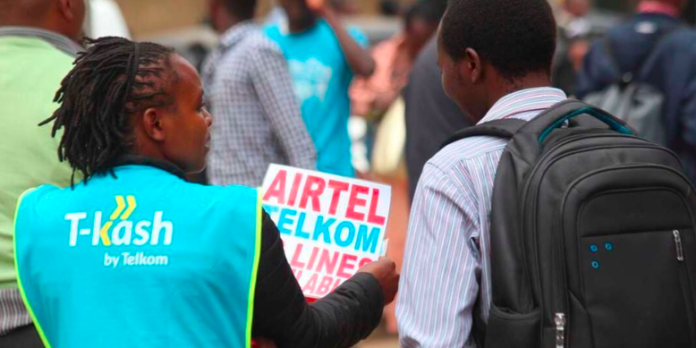By Winnie Kamau
Nairobi, Kenya: If you are a suffering customer at the hand of the Telcos then the rebuke by Communications Authority comes as a great reprieve.
Like many of my friends and family we have been complaining especially about Airtel’s connections. They work well outside but once you get inside a house or an office you experience connectivity dropouts or lack thereof. This has been frustrating for many Kenyans who do not know where to lodge their complaints against the Mobile Network Operators.
The Communications Authority of Kenya (CA) has issued warning notices to Airtel and Telkom Kenya for non-compliance with the quality of service (QoS) provided to consumers on their mobile telephony networks.
The Quality of Service Report for the year ended June 2023 released by CA shows that only Safaricom surpassed the 80% performance threshold, after attaining 90% of the set Key Performance Indicators (KPIs).
Airtel and Telkom Kenya attained 79% and 65% respectively. A mobile operator is rated compliant when they attain 80% of the set QoS KPIs.
With an industry average of 72.4%, the 2022/20203 score is a big drop compared to the previous scores, 82.3% in 2021/2022 and 75.53 percent in 2020/2021.
“Airtel Kenya Networks and Telkom Kenya failed to meet not only their coverage targets but also a number of the most critical QoS KPIs, particularly the “Unsuccessful Call Ratio” and Data Internet KPIs, which is an indicator for coverage and Internet availability/accessibility respectively”, reads part of the report.
The report further revealed that the County with the best QoS is Nairobi, scoring 93.9% while the County with the lowest QoS is Laikipia, at 54%.
The Authority had targeted conducting the QoS inspection and monitoring in all 47 counties; however, due to insecurity, the Authority did not conduct the QoS tests in Wajir, Mandera, and Garissa counties.
These scientific measurements and analyses are aimed at providing a broader view of the quality of service offered by mobile service providers.
The Authority has continuously invested in systems and infrastructure to improve the performance of the sector and its assessment methods.
Section 23 of the Kenya Information and Communications Act, 1998, mandates the Authority to ensure that licensed telecommunications operators and service providers offer good quality services in line with the license conditions.
The report also shows that mobile network connectivity projects implemented by the Authority through the Universal Service Fund (USF) have greatly enhanced the overall quality of service offered and experienced by consumers, particularly in rural and hard-to-reach areas of the country.
According to the ranking of the Telcos, Airtel Kenya Networks Kenya Limited and Telkom Kenya Limited posted an overall performance of 79% and 65%, respectively, against a target of 80%. However, Safaricom PLC attained this target by achieving an overall performance of 90%.
The report also shows that Airtel Kenya Networks and Telkom Kenya failed to not only meet their coverage targets but also a number of the most critical QoS KPIs, particularly the “Unsuccessful Call Ratio” and Data Internet KPIs, which are indicators for coverage and internet availability/accessibility, respectively.
Aging BTSs and sparse deployment of BTS are most likely the major contributing factor to the failure of Airtel and Telkom Kenya to meet the KPI thresholds. The two operators showed good performance in urbanized areas while having below-average coverage in rural areas and far-flung areas.
CA has noted with concern that Telkom Kenya Limited network appears to limit optimization in such a way that network coverage rapidly diminishes after about 5 km from the town centers and serving cells.
It was further noted that the Mobile Network Operators (MNOs) are not performing optimally even in areas where they rolled out services long ago. The network upgrades and optimization due to aging equipment, changing demographics and technology seem to pose challenges to all networks.
From the analysis Safaricom PLC scored 90% and hence achieved the minimum 80% KPI compliance threshold. The lowest score was 63.5% in Vihiga and Kajiado Counties. They shall be required to upgrade these two counties and other smaller segments noted.
Airtel Networks Kenya Limited scored 79% and hence failed to meet the minimum KPI threshold of 80% in the quality of service measured. The lowest score was 45.45% in Baringo and Laikipia Counties. The Two Telcos shall be required to upgrade their network.
Telkom Kenya Limited scored 65% and hence failed to meet the minimum KPI threshold of 80% in the quality of service measured. The highest performance was 72.73% in Vihiga, Mombasa, Nairobi and Nakuru. The lowest score was 36.36% in Muranga and Laikipia Counties. Telkom will be required to upgrade its network to full compliance.
Telkom Kenya performed lowest in terms of both data services and coverage of signal, as shown by the large number of unsuccessful calls and internet failure. The network coverage in rural counties was found to be very poor and does not exist in some places.
Airtel’s best performance was in Machakos, Mombasa, Nairobi, Kericho, Siaya and Muranga, where they scored 90.91%. The lowest performance was recorded in Baringo, Laikipia and Homabay, where they scored 45.45%.
Safaricom has better coverage in most counties compared to the other two operators. The peak performance places were Busia, Kiambu, Kwale, Mombasa, Lamu, Nyandarua, Nairobi and Mombasa. The lowest score was recorded in Vihiga and Kajiado.
The Authority has, therefore, proceeded to levy a penalty for underperformance in offering quality of service in the mobile network subsector by Telkom Kenya and Airtel Networks. The penalty was accompanied by a notice of non-compliance, which requires the networks to improve on their current performance during the next assessment and failure for which an escalated sanction level will be applied.














